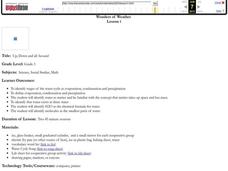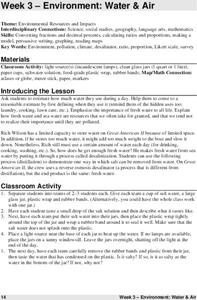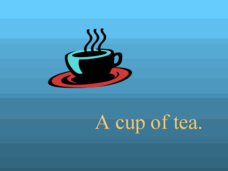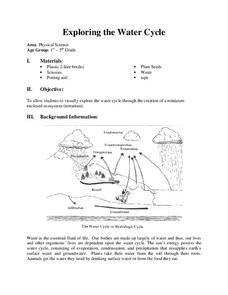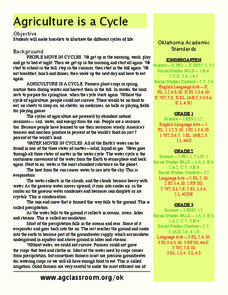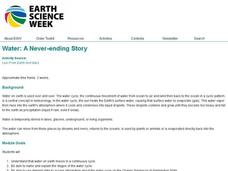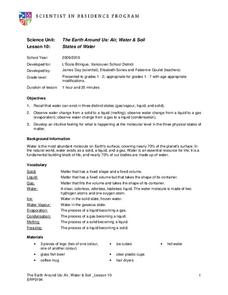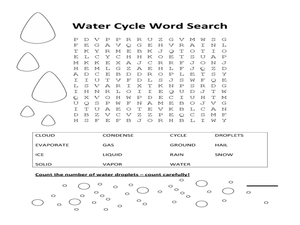Curated OER
Wonders of Weather
Fourth graders complete activities to study weather and the water cycle. In this water cycle lesson, 4th graders observe a demonstration of the three stages of water. Students work in groups to complete a water cycle lab activity....
Curated OER
Splish Splash
Students study drinking water. In this environment lesson, students draw the path of drinking water from the place of precipitation to the tap after researching a map and information from the United States Geological Survey water...
Curated OER
Clouds: A weather Predictor
Predicting the weather can be as easy as understanding cloud formations. This presentation elucidates to the reasons clouds exist and how they are classified into four different types, cumulus, stratus, vertical, and cirrus. Tip: Take...
Curated OER
What's Up With the Water Cycle?
Young scholars explore the water cycle. Students identify the stages in a water cycle and create a PowerPoint presentation based on their knowledge.
Curated OER
Unit 1 Matter and Energy
Topping this instructional activity is a comprehensive collection of notes about phase changes. The phase change graph is displayed, along with formulas for the gas laws, and information relating energy to change of phase. After...
Curated OER
Seashore Explorers
There are three separate lessons within this resource that can be used together, or that can each stand alone. In the first, five simple activities allow junior scientists to examine the amazing properties of water. In the second, they...
Curated OER
Cool Liquids
Chemistry neophytes use a temperature probe to assess the change as five different liquids evaporate. The implantation section suggests that they take readings every five seconds for a total of four minutes. They graph the data, look up...
Curated OER
Environment: Water & Air
The introduction to the instructional activity mentions a sailor's limited capacity to store drinking water on his ship. Pupils then set up an overnight experiment to remove freshwater from salt water by distillation. There is a math and...
Curated OER
Sugar in Tea
Little chemists address whether or not you can get sugar back out of tea after it has dissolved. The PowerPoint itself simply walks them through the questioning process, considering different possibilities. The final slide settles on...
Curated OER
Investigation: Evaporation
An evaporation investigation! This collection of slides walks future scientists through the process of setting up an experiment on how to speed up evaporation. The experiment is simple enough to use at the beginning of the school...
US Department of Energy
Sunlight and Evaporation
Here is a simple inquiry experiment designed to demonstrate that the energy from sunlight can evaporate water. Young scientists follow provided procedural steps to construct a model of our atmosphere using a bowl, a cup, water and...
Curated OER
The Water Cycle - Main Components
Present the water cycle to your middle schoolers with this lesson. After an anticipatory set, they participate in a Q & A session about the terms associated with the water cycle: evaporation, transpiration, condensation, and...
Curated OER
Water Changes and Moves
Students explore the three forms of water and observe how it changes from a solid to a liquid to a gas. The concepts of condensation, evaporation and the introduction to the water cycle form the basis of this instructional activity.
Curated OER
States of Matter
By viewing this PowerPoint your students' understanding of molecular energy should increase. The properties and inter-particular forces are summarized. The logical progression of information is useful, but more data to demonstrate...
Curated OER
The Happy Game: The Water Cycle
Make your students 'happy' about understanding the water cycle with The Happy Game; where young learners put their knowledge to the test to answer questions about evaporation, condensation, and precipitation. Tip: Use this game prior to...
Curated OER
The Sun as the Driving Force of the Water Cycle
Students study the water cycle and how the sun is an important factor. In this water cycle lesson students investigate how to desalinate water and explore the different densities of fresh versus saltwater.
Curated OER
The Water Cycle
Students simulate the water cycle. In this water cycle lesson, students create a model of the water cycle. Students draw the water cycle and write a paragraph explaining their drawing.
Curated OER
Exploring the Water Cycle
Students investigate the water cycle. In this water cycle lesson, students create an ecosystem within a 2-liter bottle. Students record scientific observations as they observe the water cycle within their ecosystem.
Curated OER
Rain On
Fourth graders explore evaporation and condensation. In this water cycle lesson, 4th graders investigate their surroundings for real-life examples of evaporation and condensation. Students conduct various experiments.
Curated OER
Water, Water, Everywhere!
Learners complete a WebQuest. In this water cycle instructional activity, students investigate the cycle through a WebQuest activity. Learners research the water cycle through Internet resources and create a documentary video of their...
Curated OER
Agriculture is a Cycle
Students explore cycles in nature. In this cross curriculum agriculture lesson plan, students define "cycle" and research weather and planting folklore. Students make a bracelet in which individual colored beads represent the many...
Curated OER
Water: A Neverending Story
Learners investigate the water cycle. In this water cycle science lesson, students participate in a series of activities that demonstrate evaporation, precipitation, and condensation. Learners describe their observations using...
Curated OER
States of Water
Learners investigate the 3 states of matter. In this physical science "matter" lesson, students observe and participate in a number of demonstrations involving melting and freezing water. Learners observe the effect heat has on changing...
Curated OER
The Great Melting Race
Students show their knowledge by choosing the correct answer about solids, liquids and gases. Students also write short answer responses to questions about experiments they have done.


